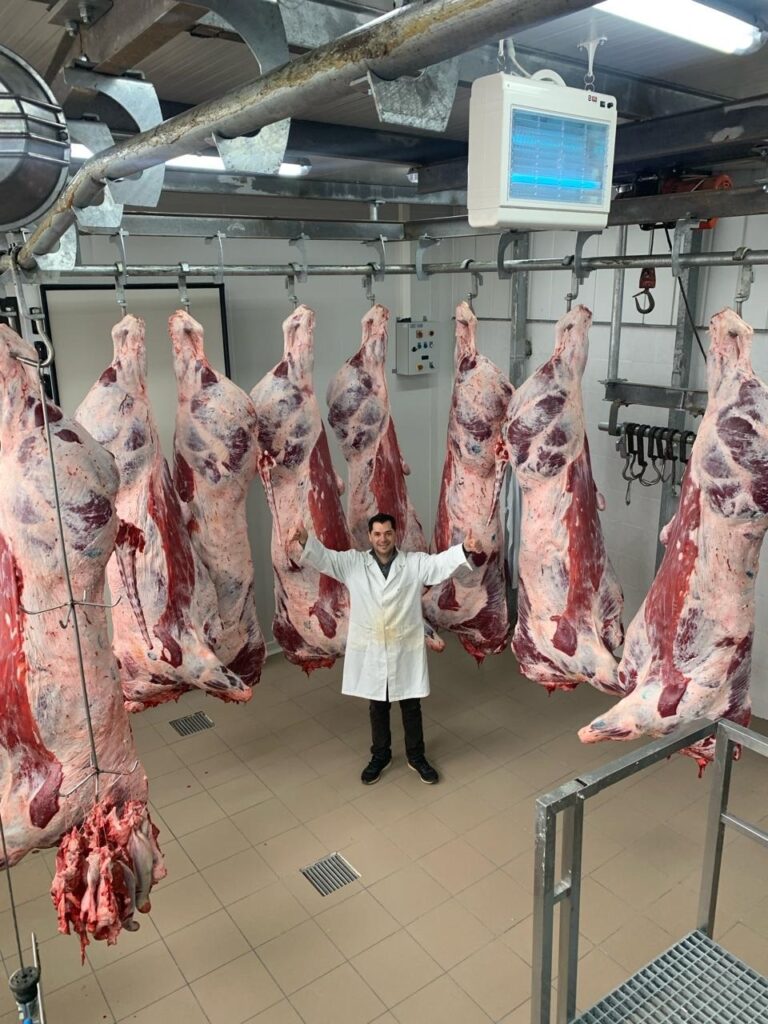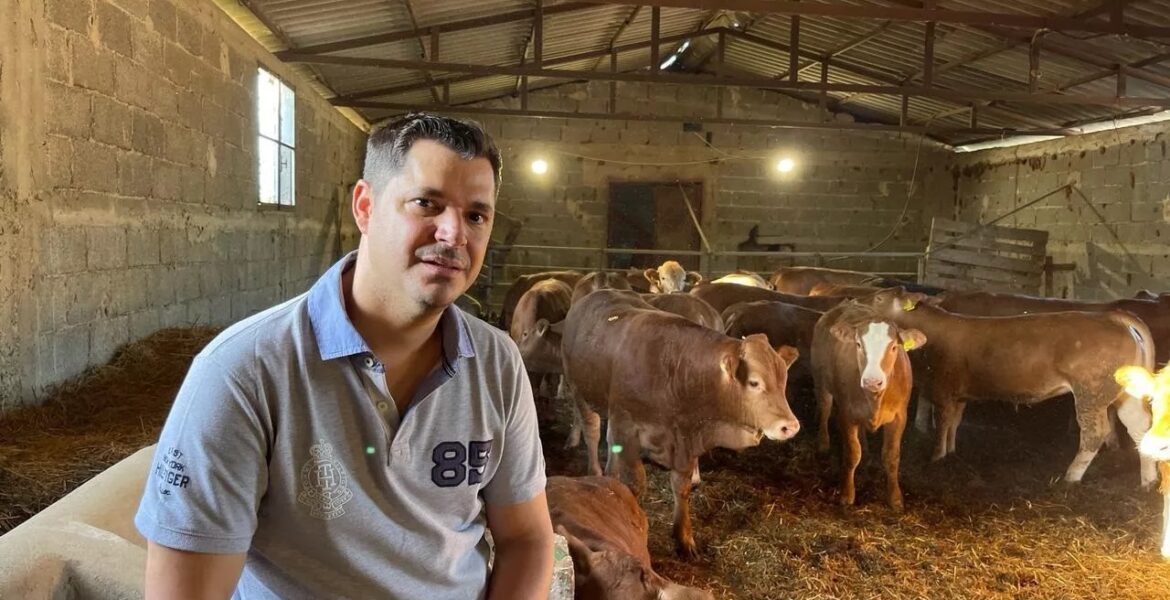Kostas Litsas is a fourth-generation breeder and third-generation butcher who introduced his customers to the secrets of quality meat eating and premium cuts of beef while sharing useful tips on cooking methods, especially now that Easter is approaching.
From the small stable in Kalamos to raising calves in France
From father to son, the Litsas family’s livestock breeding knowledge has been passed down experientially – for years now – with the first chapter of their history written in a small stable in their place of origin, in Kalamos. Kostas’ great-grandfather first cared for his few goats, sheep and lambs, raising his son in this environment.
“My grandfather, however,” Kostas tells me, “decided to take his father’s venture one step further. So he opened a shop to sell his meats to locals, visitors, and holidaymakers, who quickly spread his fame everywhere, inside and outside of Kalamos.”
In the mid-60s, the increased needs led to the relocation of the stable to a larger area, which was gradually strengthened by the addition of calves, the milking parlour and the cheese factory (and years later, by the slaughterhouse).
“All this, while my grandfather’s two sons had already taken over the reins of the business for good, continuing their common path until my father went down the path of Local Government and was elected in 2006 as the first mayor of Kalamos… And the last because it was merged with the municipality of Oropos,” he said.

“I started with 24 calves”
But before he left, he had managed to ensure that his only son, Kostas, also had a pure love for animal husbandry. Kostas decided to build his animal husbandry unit, staying in Kalamos but opening his own butcher shop in Filothei.
“There, I saw that people were asking for a lot of veal, so I decided to fill my stable exclusively with veal. I started with 24 calves and have now reached 400, creating the only vertically integrated meat unit in Greece—until now. No other unit in our country has a herd, a fattening house, a slaughterhouse, and a retail store,” he said.
“The calves here, from the moment of conception (the semen comes from France, and these calves carry in their DNA elements from 7 different breeds) and their birth until their growth and slaughter, are all under my personal supervision. No vaccines, no hormones and drugs, everything as pure as the previous generations taught me,” Kostas added.
The ties with Nevrokopi and the trips around Greece to select breeders
With these calves and with some more that he procures from Nevrokopi, from the stable of his fraternal friend, Vassilis (the calves are bred there and end up exclusively at the slaughterhouse of Kostas), he fills his refrigerators in his store every day in Filothei, and supplies two taverns: To “Zaki” in Kapandriti and Karantanos in Kalamos.
As for the rest of the meats, he also gets lambs from Mr Giorgos (a local breeder in Karystos with whom his grandfather also worked), conventionally raised chickens from Angelakis, organically raised chickens from Biogreco in Sparta, and free-range pasture chickens from Manzio in Ioannina, as well as imported Black Angus from America and Wague from Japan.
“I also have 25 hens in Kapandriti but don’t buy their meat. I have them so that I collect their eggs every morning and give them to my daughters or clients with small children,” he told me.
In the near future, he is thinking of adding sheep to his stable, although, as he admits, “most people” don’t let him do it because they think I will have a lot of losses and that I will be broken into a thousand and two pieces to catch up with them all.
And perhaps they are not wrong since, moreover, as I learn from his wife Argyro, who is also his valuable partner, most of the work passes through his hands. He takes care of his animals, cleans his stables every day, works at the butcher’s shop, and drives his trucks to Nevrokopi twice a month to load the calves from his second stable with Vassilis.
In full readiness for Easter

Every year, preparations at Kostas’ stable and butcher shop start early.
“I bring my lambs from Karystos on time”, he tells me, “and I raise them from 30 days old. I remember the lambs in the Kalamos shop; they left whole with their spit.”
“In Filothei, Psychiko, and the wider area, they don’t ask for the whole lamb, only the legs or half a lamb for the oven. Of course, the residents in these neighbourhoods especially love barbecues because of their spacious yards, so all year round, they go out and grill in their garden,” Kostas clarified.
“On the other hand, no matter how we do it, Easter without a rooster and kontosouvli can not be done. So some people bring their spits, and we fill them. Others get our ready-made skewers (they are marinated either with dark beer and honey or chicken skewers with lemon and mustard or spicy Tex-Mex sauces).
There is no shortage of those who prefer our various preparations, such as small chickens, gardoubaki, frygadella or marinated lamb legs”
He will never forget two years ago, on Holy Saturday, when the restrictive measures to protect against the coronavirus were already in force, a queue of people about 300 metres long had formed outside the store.
“Not only did I not let anyone leave without meat, but just before I closed and while I was starting to roll down the shutters, a little girl with her dad asked me for the last lamb I had in my refrigerator, which I intended to take home. I went home without a lamb, but I closed, feeling satisfied that I was able to serve everyone,” Kostas said.
Info: LITSAS Meat-Delicatessen, 64 Kapodistriou Avenue, Filothei, tel. 210 6811000
Loukia Chrysovitsanou is a columnist for Cantina. Translated by Paul Antonopoulos.
READ MORE: Gogges: Learn the art of handmade Peloponnesian pasta.

